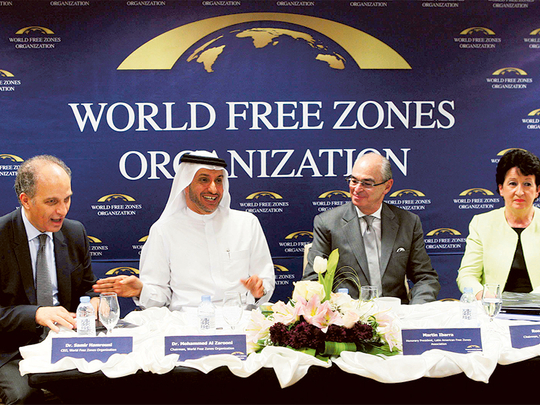
Dubai: Building unified standards for free zones around the world will contribute to the global economy, Dr. Mohammad Al Zarouni, Chairman of World Free Zone Organization (WFZO), told Gulf News.
Dubai will host the first International Conference and Exhibition of the WFZO on Monday.
Al Zarouni said: “The organisation is working to create ‘best in class’ standards for free zones that enhance the economic ecosystem both globally and in local markets, as well as guidelines for the establishment and administration of free zones.”
“No two free zones are the same. They must each reflect their specific social, economic and geographical pretexts,” he said. “However, there are certain practices and processes that can be employed through the world and which is almost universally can help to deliver the performance in the free zones.”
A “free zone” means that there are no customs charges for any business transactions, but variations between free zones around the world vary significantly in term of taxation, the requirement for doing business, and the legal framework, Al Zarouni said. The WFZO, which launched in Dubai in 2014, seeks to represent the interests of free zones on the global stage and act as a knowledge base and platform for the exchange of best practices.
“The new international community, WFZO, is a great enabler of success for all free zones, and by joining this new international community, these zones can achieve more and ensure economic sustainability for the host country,” he said.
Free zones have been instrumental in developing the economies of many countries around the world. However, to date, there has been no successful global organisation to represent their interests to the international community and act as platform for the exchange of ideas and best operational practices. The World FZO is now that organisation.
Among the key objectives achieved are raising awareness of the benefits that free zones can bring in terms of enhancing foreign direct investment and trade; promoting cultural diversity; driving innovation and skills development; and creating new jobs and industries, as well as enhancing the economic ecosystem both globally and local markets, he said,
151 members have joined the organisation in less than a year.
Al Zarouni said there are more than 3,500 free zones around the world today, supporting 70 million jobs and more than two per cent of the global labour force, a figure that continues to grow.
Currently, there is no official data about free zones in the world.
“We aim to provide a range of support services for our members and the wider business community, including training and development program and insights on how to achieve improved business performance and stability,” he said, That includes plans to offering a master’s degree about the concept of free zones, he said.
During a press conference held on Sunday to announce more details about the First International Conference and Exhibition for WFZO, which will be held for three consecutive days under the title ‘Toward a New Global Trade Order’, Dr. Samir Hamrouni, CEO of WFZO, said that the organisation aims to increase its member up to 300 by the end of this year.
“This growth will provide us with ever-wider access to data and experience. It will help to build an atlas, a fully comprehensive global map of the world’s free zones for the first time,” he said.
This database will give details on the sizes of free zones, how trade flows between free zones and which zone is working well, Hamrouni said.
“Through the organisation we will be able to visualised how this growing community of economic investment zones is changing the global supply chain, supporting socioeconomic growth and revolutionising how investors think,” he said.












